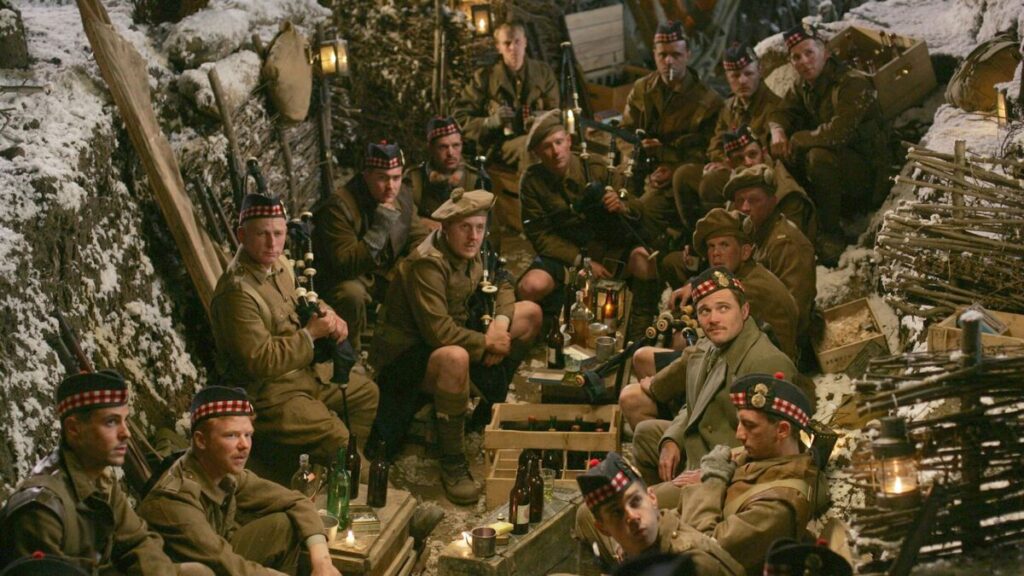
WITHOUT AN ENEMY THERE CAN BE NO WAR.

2015 has in many ways been an awful year, with heinous terrorist acts, a never-ending war in Syria, a refugee crisis in Europe, and a resurgent far-right movement visible not only on that continent but also in the U.S. Republican primaries. This planet needs a big hug… and a lot more action to heal its wounds. Perhaps the most fitting Christmas movie to watch this year is the ten-year-old Joyeux Noël, a call for brotherly love in the worst of times.
Increasingly pointless life in the trenches
After the outbreak of World War I in 1914, enthusiastic young men go to war in Europe only to find expectations of adventure crushed in trenches where life in between watching your friends get maimed or killed is increasingly pointless. We follow infantrymen from France, Germany and Scotland, all of them facing Christmas far away from their families. They include a Scottish priest (Gary Lewis) serving as a stretcher-bearer, a Jewish-German lieutenant (Daniel Brühl) and a French lieutenant (Guillaume Canet) who’s had to leave his pregnant wife behind.
On the German side there’s also a famous tenor, Nikolaus Sprink (Benno Fürmann). After getting permission to reunite with his fiancée, Anna Sørensen (Diane Kruger), an equally famous soprano, to entertain officers near the front, Sprink returns to the trenches – with Anna in tow.
Moving display of humanity
Even though all the characters are fictional, the movie was based on actual events. The so-called Christmas truce of 1914 was a series of unofficial meetings in no-man’s-land between enemy combatants where they greeted each other, sang Christmas carols, collected their fallen comrades for burial and even played soccer together. All for a brief period of time. This moving display of humanity was condemned by warmongering authorities on all sides and wasn’t repeated to the same extent in following years, partly due to increased bitterness as the war dragged on and on.
We believe in these characters and are moved by what they go through.
The film was made by a French director, but the cast has many nationalities. A lavish production like this runs the risk of becoming a costly Europudding, but Caron keeps everything in check. The story is thoroughly researched and has the realism we expect, boosted by some helpings of sentimentality, but it’s never overdone. We believe in these characters and are moved by what they go through. The truce is depicted with the right approach, almost rendering a touch of magic as soldiers approach each other warily in the darkness of Christmas night. The trenches are realistically recreated and the fighting staged with intensity – but never turning so gruesome as to make it impossible for younger viewers to watch the film and learn from its pacifist message. Technically, the cinematography, production design and music are the key ingredients that transport us emotionally to this time and place.
A uniformly good cast without any particular standouts, although Ian Richardson has a juicy role, one of his last, near the end, as a wicked, nationalist bishop who preaches war. Kruger gets top billing, but isn’t as compelling as some of the minor roles; the sole prominent female actor, she represents the angelic virtues of Christmas, but the greatest impact in her scenes is created by Natalie Dessay, the singer doing her voice.
Audience-pleasing and easily accessible; few filmmakers can master that art fully. This is the kind of story that especially Europeans should see more of, one that underlines the bonds between us. Those values are needed to counter the new nationalist voices heard all over the continent.
Joyeux Noël 2005-France-Germany. 116 min. Color. Widescreen. Written and directed by Christian Caron. Cinematography: Walther van den Ende. Music: Philippe Rombi. Production Design: Jean-Michel Simonet. Cast: Diane Kruger (Anna Sørensen), Benno Fürmann (Nikolaus Sprink), Guillaume Canet (Camille René Audebert), Gary Lewis, Dany Boon, Alex Ferns, Daniel Brühl, Ian Richardson.
Trivia: Alternative title in English: Merry Christmas. Later turned into an opera called “Silent Night”.
Last word: “I’m not a specialist but there’s no religion I can imagine that has not been touched by that kind of manipulation so let’s be very careful. I wanted to put it in my movie because there were two ways of believing in God at that time, some people who wanted to involve God in the war itself, and other people who believe in God but in a peaceful way.” (Caron on the factual basis for the sermon of hate that Richardson gives in the film, KPBS)
